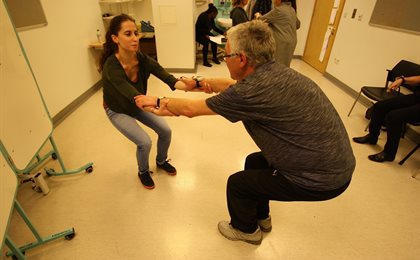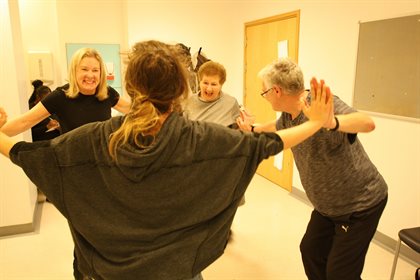Dance for Chronic Obstructive Pulmonary Disease
Dance for Chronic Obstructive Pulmonary Disease (COPD) explored dance as an exercise therapy for patients with the long-termlung condition COPD.
 A focus group of patients, academics and a choreographer co-designed and trialled dance workshops for patients living with COPD. Patients’ opinions and experiences combined with research evidence for exercise performance and rehabilitation in lung disease were used as the basis for developing a dance programme for COPD that was tested and refined over a series of classes for patients.
A focus group of patients, academics and a choreographer co-designed and trialled dance workshops for patients living with COPD. Patients’ opinions and experiences combined with research evidence for exercise performance and rehabilitation in lung disease were used as the basis for developing a dance programme for COPD that was tested and refined over a series of classes for patients.
Approximately 1.2 million people in the UK suffer from the lung disease COPD. There is no cure, but exercise classes are known to be one of the most effective treatments to reduce symptoms and improve quality of life. Poor uptake and attendance at these standard classes reduces the number of people benefitting from exercise. The reasons underlying these problems are complex but may include negative preconceptions about exercise, lack of enjoyment and discomfort about exercising in public. Novel approaches are sought to address these issues.
 Dance for COPD demonstrated appropriate elevations in patients’ heart rates and minimal reductions in blood oxygen levels. They reported improvements in mood, high levels of enjoyment and satisfaction with the classes and enhanced feelings of social cohesion afterwards, stating that the collaborative and group nature of the classes was particularly beneficial. Discussions after each class also indicated participants’ distinct preference for this form of exercise over standard gym-based pulmonary rehabilitation classes. Interestingly, all participants underestimated the duration of the sessions, suggesting that concentration on choreography allowed them to exercise for longer and/or at a higher intensity.
Dance for COPD demonstrated appropriate elevations in patients’ heart rates and minimal reductions in blood oxygen levels. They reported improvements in mood, high levels of enjoyment and satisfaction with the classes and enhanced feelings of social cohesion afterwards, stating that the collaborative and group nature of the classes was particularly beneficial. Discussions after each class also indicated participants’ distinct preference for this form of exercise over standard gym-based pulmonary rehabilitation classes. Interestingly, all participants underestimated the duration of the sessions, suggesting that concentration on choreography allowed them to exercise for longer and/or at a higher intensity.
The data acquired through this trial is providing robust support for applications to major funding bodies for future Dance for COPD programmes. These will allow larger groups of patients to attend dance sessions over an extended period and changes in muscle strength, fitness, quality of life, balance and mood will be further investigated.
Project feedback
I found this project utterly uplifting and was thrilled by the positive feedback from the participants. Evangelia’s skills in movement and body awareness added a valuable extra dimension to exercise for people living with lung disease, and allowed us to push boundaries by which we are often constrained in clinical practice. I certainly believe that dance-based exercise has the potential to enhance clinical care in this population.
Dr Victoria MacBean, academic lead
It was a highly rewarding experience to work with the brilliant team of academics and realise how much dance can offer to people with lung disease. The project enriched my artistic practice in multiple ways and I acquired new knowledge relating to the physiology of the body which will be useful for the next stage of this research and also for my artistic practice in the future.
Evangelia Kolyra, artistic lead
When you’re dancing and there’s a few of you, you get a laugh and a giggle going… I probably feel a bit more euphoric [compared to standard exercise classes]. I was a bit more comfortable dancing than doing weights.
Project participant
Project team
Dr Gerrard Rafferty, Department of Respiratory Medicine, Faculty of Life Sciences & Medicine. Ged is a Reader in Human Physiology at KCL and has a background in Physiology. He supervises many of the projects running in the King's Respiratory Muscle Lab as well as teaching within the University. Ged’s research interests include how muscles throughout the body are affected by lung diseases, how best to measure this, as well as different aspects of how we can help adults and children with their breathing particularly when on intensive care.
Evangelia Kolyra, Choreographer. Evangelia is a Greek, London-based choreographer and performer who is interested in performative work which takes place within theatre spaces, site-specific, film and installation contexts. Her work aims to offer audiences a kinaesthetically rich experience of the unexpected, humorous and sometimes dark or sinister sides to the psychology of human experience, presented within highly detailed and physically demanding choreography. She has been featured in various platforms and festivals in Europe (England, Scotland, Greece, Italy, Sweden) and she is working towards developing a cross-disciplinary and highly collaborative practice.
Dr Victoria MacBean, Physiotherapy Research Associate and Knowledge Exchange Associate at King’s. Vicky is a children’s respiratory physiotherapist and has been working in King's Muscle Lab since 2009, measuring how hard the breathing muscles work in children with breathing problems and healthy children. Her research aims to understand how the breathing muscles work differently when children have breathing problems, and to see if we can use this to make decisions about the best treatments to give sick children.
Dr Charles Reilly, Consultant Physiotherapist in Chronic Respiratory Disease at King’s College Hospital NHS Foundation Trust. Charles' job is shared between working directly as a physiotherapist with patients with a variety of long-term breathing problems and research, some of which is within the King's Muscle Lab. Charles has worked in the lab since 2007 and has done much of his research looking at how the breathing muscles work in healthy people and adults with cystic fibrosis, as well as running studies for patients with severe breathlessness.
Social Media
Find out more about the project team.
King's Muscle Lab Twitter here.
Evangelia Kolyra's website here and Twitter here.
The use of dance in pulmonary rehabilitation for Chronic Obstructive Pulmonary Disease is a collaboration between King's College London’s Department of Respiratory Medicine and Evangelia Kolyra. It was supported by the university's Culture team.